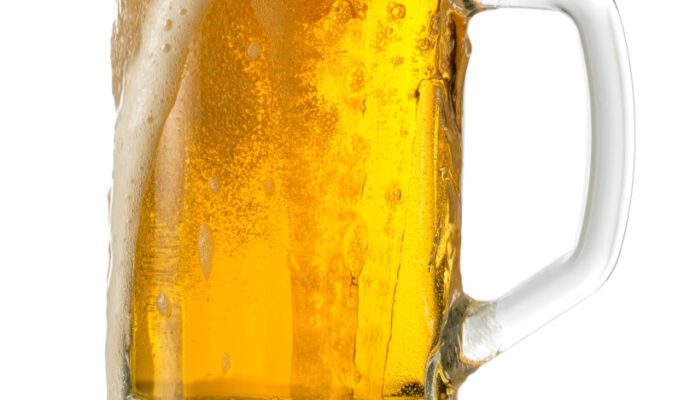Can You Use RO Water To Brew Beer?

Owing to its 90 to 95% content in beer, your brewing water must be of the highest quality. Reverse Osmosis (RO) water is renowned for purity, so should you use it to brew beer?
You can use RO water to brew some beer types despite lacking minerals. Due to its preparation process, it is as pure as distilled water. However, other beer styles, like Brown Ale, will need essential salts for an improved flavor. These salts can be calcium chloride, gypsum, baking soda, etc.
Continue reading this article to learn more about home beer brewing with RO water. I’ll also further discuss how the water is prepared, what makes it pure, and the brewing salts you’ll need.
Brewing Beer With RO Water
When homebrewers get a poorly-tasting beer, they quickly blame their yeast quantity, malt selection, or bad hops. However, your brewing water is arguably the most critical ingredient you shouldn’t mess up.
The water that’s most accessible to you will determine the kind of beer you can brew.
If the local water supply has very alkaline water, stout-style beers are most recommended to brew. And if you only have access to distilled water, I highly recommend you don’t brew any beer directly with it.
With RO water, you’re free to brew certain beer types without adding anything to it, such as Czech-style Pilsner lager. You can brew any type of beer with RO water after adding the necessary salts.
As with any other type of water, brewing with RO water takes a minimum of four weeks.
What Is RO Water?
For many reasons, people are highly concerned with the quality of their water, and they’ve turned to various sources and processes for getting purified water, including RO. But what exactly is it?
RO water is any water purified by reverse osmosis. The process involves passing water through a semi-permeable membrane to separate ions, unwanted molecules, and larger particles. The particles will remain on the pressurized side of the membrane while the purified water moves to the other side.
This may sound like a complex procedure, but you can easily have a RO system at home.
The APEC Osmosis Water Filter System (available on Amazon.com) is the one I recommend if you’re looking to buy yours. The system purifies your water efficiently by utilizing reverse osmosis to remove certain minerals. It comes with multiple filters for impurities of different sizes.
Moreover, the APEC RO system comes with a comprehensive installation material that only requires tools you already have at home.
When you’ve completed the installation and purified your water, it will be free of its excess minerals, which may or may not be essential to your next brew.
Using Essential Salts When Brewing With RO Water
RO water is much better than tap water, especially if you’re unsure of the content in your tap water. Tap water can greatly vary in mineral content, and you’ll be gambling every time you brew with it.
For instance, many urban town supply services use chlorine to kill micro-organisms, which makes water safer for drinking. However, this chemical element negatively impacts beer flavors and hinders yeast growth, which is essential for brewing.
On the other hand, getting rid of all your water’s minerals isn’t the best practice for brewing. There can be some desirable minerals in tap water, and the RO system will get rid of them.
The brewing steps with RO water are still similar to those I’ve extensively discussed in my article about whether homebrewing is worth your time.
But in this case, you’ll need to manually add absent minerals to the water in calculated quantities.
Depending on the type of beer, you’ll have to add different salts. Here’s an overview of the subject:
| Salt | Reason | Amount | |
| 1. | Gypsum (Calcium Sulfate) | Provides calcium ions, introducing permanent hardness to RO water. It also prevents beer stone and promotes yeast flocculation. | One teaspoon per five gallons. |
| 2. | Chalk (Calcium Carbonate) | Raises the pH level of the mash, which may be too acidic. | 370 mg to 570 mg per gallon of darker beers. 92.5 mg to 185 mg per gallon for pale beers. |
| 3. | Epsom Salt (Magnesium Sulfate) | Promotes permanent hardness in RO water and improves hop’s bitterness. | One gram per gallon. |
| 4. | Baking Soda (Sodium Bicarbonate) | Raises the pH level of the mash, which can cause an astringent taste in beer if left acidic. | 830 mg per gallon of dark beer. |
| 5. | Table Salt (Sodium Chloride) | Helps improve your beer’s flavor and promotes bubbles. | Half ounce to an ounce per five gallons. |
If you’re not sure about which beer variety you should go for, check my article on the easiest types of beer you can brew.
Let’s look at each type of beer in more detail.
1. Gypsum (Calcium Sulfate or CaSO4)
This white, crystalline powder is a rich source of calcium ions, which adds permanent hardness to your brewing water.
Moreover, calcium improves yeast flocculation and promotes protein precipitation in the boil. It also prevents beer stone—a gray-brown calcium oxalate that forms on the brewing apparatus’s inner surfaces.
Gypsum is not imperative for many beer types, including lagers. I recommend you use a teaspoon per five gallons.
2. Chalk (Calcium Carbonate or CaCO3)
Chalk is essential for its carbonate, which is indispensable for all-grain brewing.
Carbonate raises residual alkalinity in the water and increases the pH of the mash, which may be too acidic. You’d need to add more carbonate for darker beers (370 mg to 570 mg per gallon) than for pale beers (92.5 mg to 185 mg per gallon).
3. Epsom Salt (Magnesium Sulfate or MgSO4)
Epsom salt provides magnesium and sulfate—both of which are essential for making beer.
Magnesium, like calcium, promotes permanent hardness in RO water, while sulfate ion helps accentuate the bitter flavor of the hop.
Both elements in Epsom salt enhance the enzyme action of the mash to achieve the desired flavor profile and adjust the wort’s ion content.
One gram per gallon is a good starting point, but you can go higher depending on the beer.
4. Baking Soda (Sodium Bicarbonate or NaHCO3)
In case you can’t get calcium carbonate to raise the pH level of the mash, baking soda is a popular alternative.
Keep in mind that if the mash remains acidic for too long, tannin will start to be extracted from the malt, which will cause your beer to attain an astringent flavor.
For lighter beers, I recommend 2.25 grams of baking soda for 6.75 gallons of water.
However, dark beers need a carbonate concentration of at least 150 ppm. In order to achieve that, you should add 5.625g of baking soda to 6.75 gallons of water.
5. Table Salt (Sodium Chloride or NaCl)
Chloride helps beer attain its characteristic taste. Although you can also find them in calcium chloride, sodium chloride is more common.
Moreover, table salt promotes bubbles in beer by clinging to carbon oxide—the chief compound that aids carbonation. Some homebrewers love how it buffers the bitterness of the beer by accentuating its malty flavor.
Late in the boil, you can add half an ounce to a full ounce of table salt to five gallons of beer.
Conclusion
You can use RO water to brew beer, but you may have to add salts depending on the type of beer. These salts include baking soda, table salt, Epsom salt, and gypsum.
RO water is any water purified by reverse osmosis. This process eliminates all minerals, including essential ones. You can buy an RO system online if you don’t have one.



